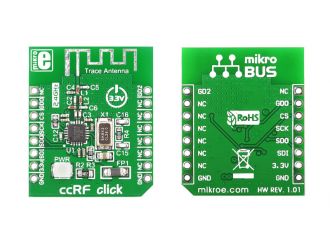
We strongly encourage users to use Package manager for sharing their code on Libstock website, because it boosts your efficiency and leaves the end user with no room for error. [more info]

Rating:
Author: MIKROE
Last Updated: 2019-07-31
Package Version: 1.0.0.1
mikroSDK Library: 1.0.0.0
Category: 2.4 GHz Transceivers
Downloaded: 7912 times
Followed by: 1 user
License: MIT license
This is a sample program which demonstrates the use of ccRF click. Programmer uses RF module for communication between two development systems. Each module can be used as transmitter and receiver.
Do you want to subscribe in order to receive notifications regarding "ccRF click" changes.
Do you want to unsubscribe in order to stop receiving notifications regarding "ccRF click" changes.
Do you want to report abuse regarding "ccRF click".

Library Description
The library covers all the necessary functions to control ccRF Click board. A library performs the communication with the device via SPI interface with CC2500 low-power 2.4 GHz transceiver.
Key functions:
void ccrf_writeBytes( uint8_t regAddress, uint8_t *writeData, uint8_t nBytes ) - Sequential ( burst ) write function.void ccrf_readBytes( uint8_t regAddress, uint8_t *readData, uint8_t nBytes ) - Sequential ( burst ) read function.void ccrf_defaultConfiguration() - Default configuration function.Examples description
The application is composed of the three sections :
void applicationTask()
{
char receivedData;
if ( UART_Rdy_Ptr() )
{
receivedData = UART_Rd_Ptr();
switch ( receivedData )
{
case 'T' :
{
modeSelected = _CCRF_TX_MODE;
mikrobus_logWrite( " TX Mode ", _LOG_LINE );
break;
}
case 'R' :
{
modeSelected = _CCRF_RX_MODE;
mikrobus_logWrite( " RX Mode ", _LOG_LINE );
break;
}
case 'I' :
{
modeSelected = _CCRF_IDLE_MODE;
mikrobus_logWrite( " Idle Mode ", _LOG_LINE );
break;
}
}
}
switch( modeSelected )
{
case _CCRF_TX_MODE:
{
lengthTx = sizeof( txBuffer );
ccrf_transmitPacket( &txBuffer[ 0 ], lengthTx );
Delay_ms( 1000 );
break;
}
case _CCRF_RX_MODE:
{
lengthRx = sizeof( rxBuffer );
if ( ccrf_receivePacket( &rxBuffer[ 0 ], &lengthRx ) )
{
for ( cnt = 0; cnt < lengthRx; cnt++ )
{
mikrobus_logWrite( " rxBuffer[ ", _LOG_TEXT );
ByteToStr( cnt, logText );
ltrim( logText );
rtrim( logText );
mikrobus_logWrite( logText, _LOG_TEXT );
mikrobus_logWrite( " ] = ", _LOG_TEXT );
ByteToStr( rxBuffer[ cnt ], logText );
ltrim( logText );
mikrobus_logWrite( logText, _LOG_LINE );
}
mikrobus_logWrite( "----------------------", _LOG_LINE );
}
break;
}
}
}
Other mikroE Libraries used in the example:
SPIUARTConversionAdditional notes and informations
Depending on the development board you are using, you may need USB UART click, USB UART 2 click or RS232 click to connect to your PC, for development systems with no UART to USB interface available on the board. The terminal available in all MikroElektronika compilers, or any other terminal application of your choice, can be used to read the message.